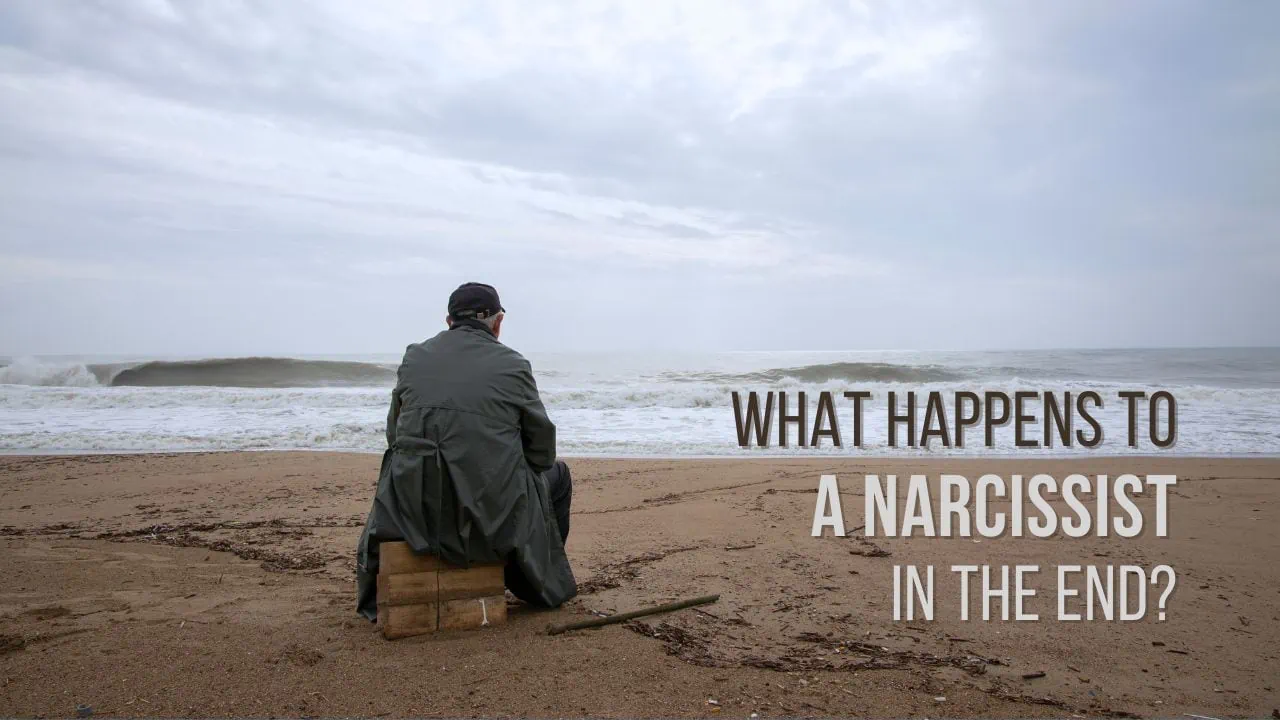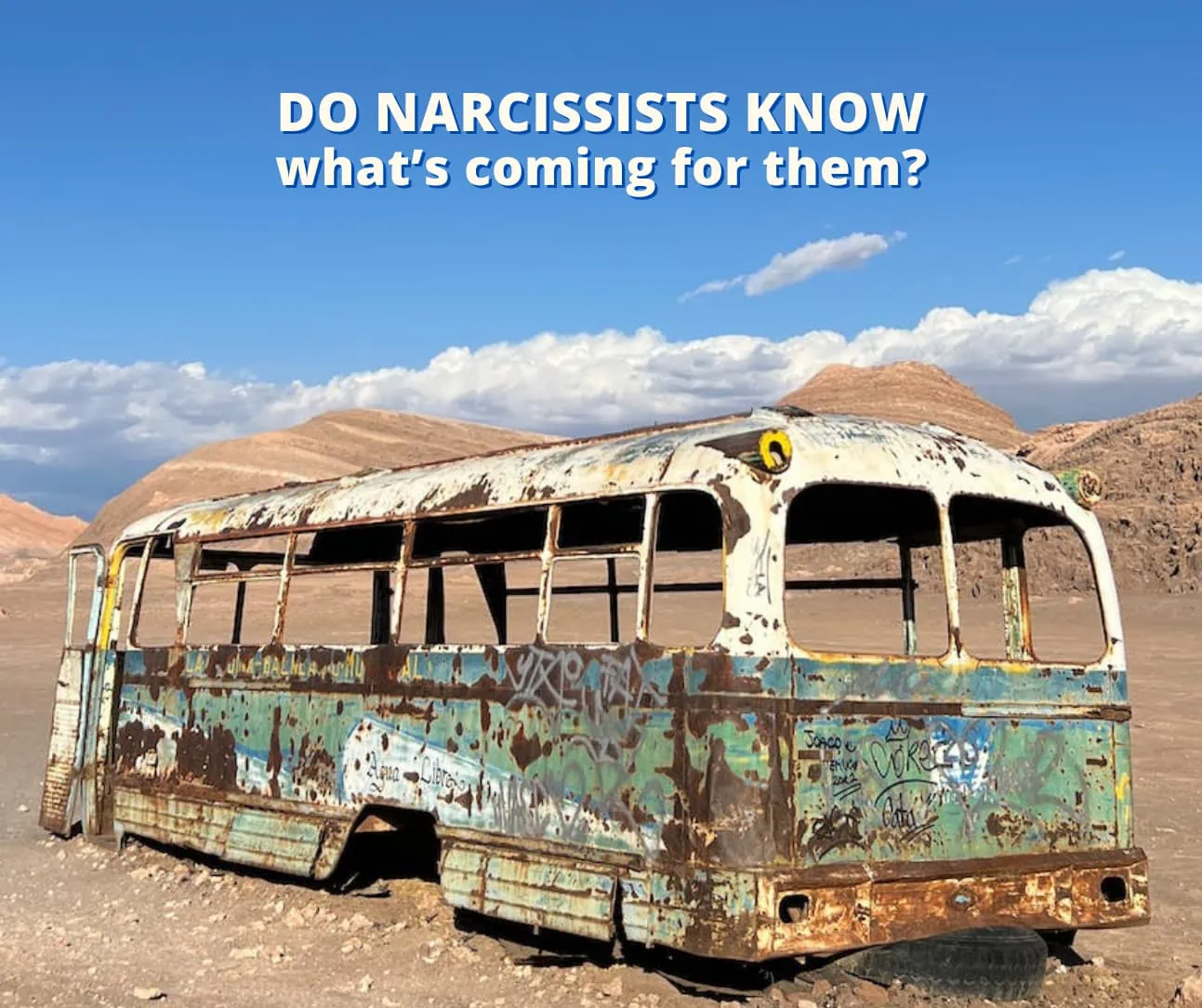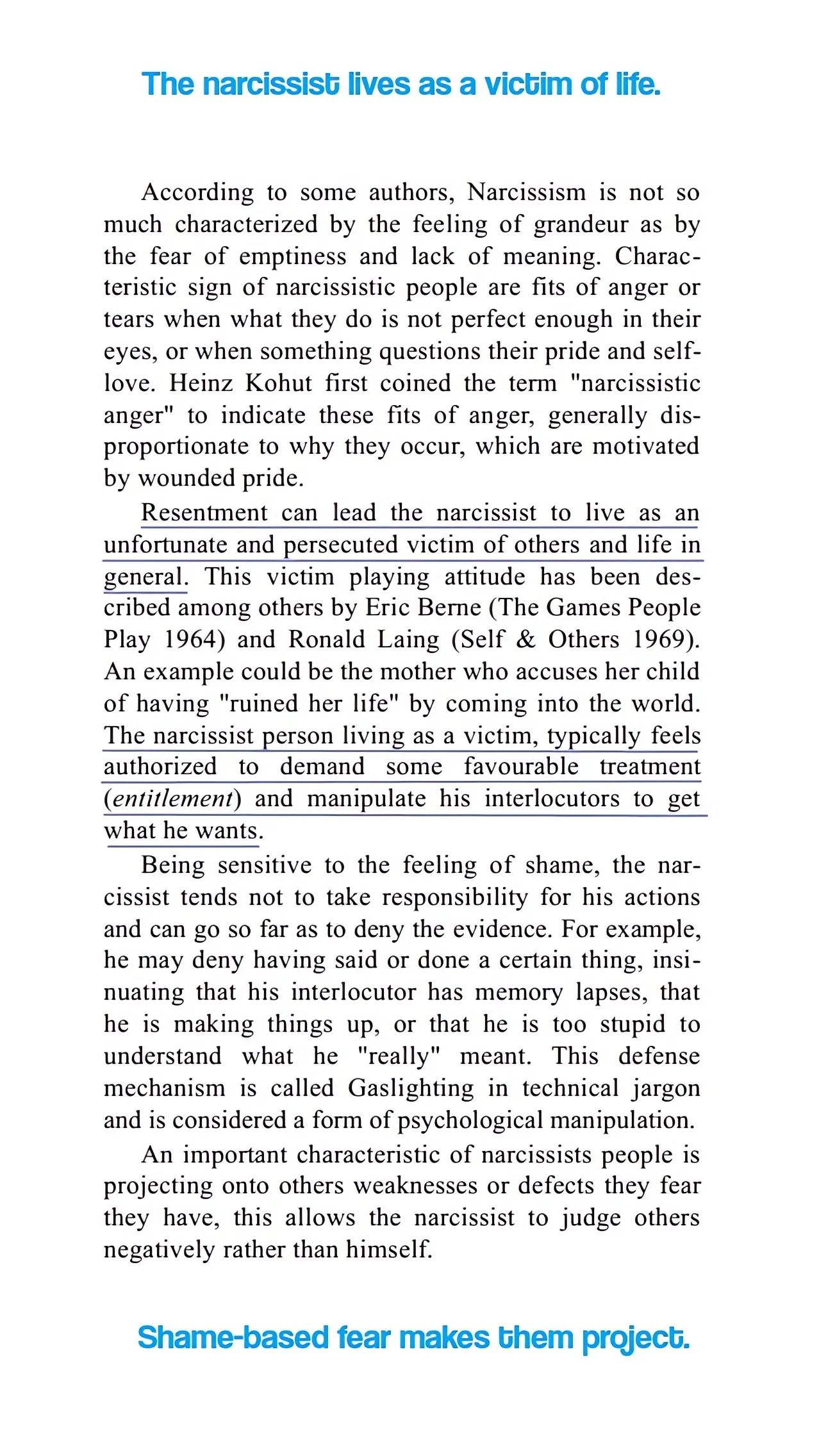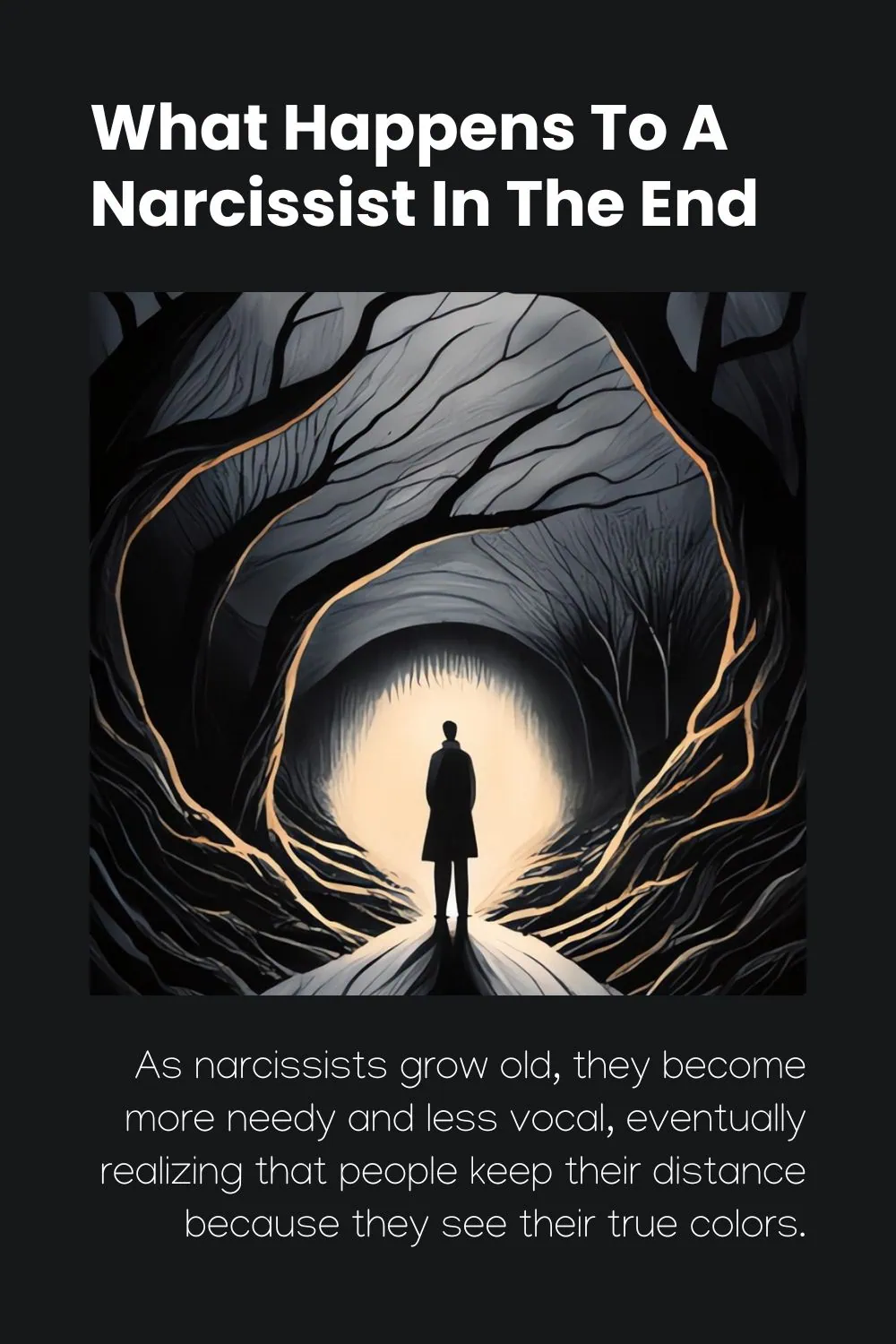Today's Tuesday • 10 mins read
— By Dr. Sandip Roy.
Pitiful things happen to narcissists in the end:
- They become submissive and helpless.
- They become needier and lonelier, yet everyone avoids them.
- They grow more insecure since they realize they have no charms left.
In the end, aging narcissists become worse off, quieter, finally accepting that people avoid them as they all know his/her true nature.
A rough sketch of a narcissist shows someone who holds himself as highly important, but heavily needs the approval of others to feel their self-worth.
What Happens To An Aging Narcissist In The End?
Here are a few things they are likely to show as they become old and reach the end of their lives:
1. Become sadder
By the time a narcissist, male or female, reaches old age, they become a pitiful spectacle. If you see their sad faces, you would really take pity on them.
While most people tend to get happier at older ages, narcissists become the reverse.
In fact, if you ask about their situation, an aged narcissist would portray themselves as a sad victim hurt by everyone.
We, ordinary folks, experience the most joyful times in our lives at younger and older ages.
This survey of over 300,000 UL adults found that life satisfaction, happiness, and meaningfulness in life peaked between 65 and 79 years of age.
According to studies (Plagnol & Easterlin, 2008; Diener & Chan, 2011; Steptoe and Deaton, 2015), an increase in older people’s happiness correlates with:
- higher satisfaction in terms of material needs and human relations at these ages,
- a readjusting of life expectations, and
- the fact that happier people tend to live longer.
However, older narcissists become increasingly unhappy.
The likely reason is: Narcissists heavily need validation and praise to feel good. But in their sunset years, people avoid them, and there’s no one to assure them how good they or their accomplishments are.

Toward the end, age makes the narcissist into a pathetic sight. Their behavior made everyone who cared about them leave.
2. Live alone
Most narcissists will be living alone by the end of their middle age. Most of their family and friends would have abandoned them.
Research finds that aging narcissists who had higher degrees of vanity in their youth end up in unstable, toxic relationships. They were highly likely to get divorced and have fewer children when they reached middle age.
Narcissists choose a solitary life as they near the end of their lives because they realize they can no longer safeguard their self-worth.
Otto Kernberg (1976), psychoanalyst and professor of psychiatry at Weill Cornell Medical College, described the narcissist’s relationship with others as “clearly exploitative and sometimes parasitic… as if they feel they have the right to control and possess others.”
One study found that narcissistic intrusion during early childhood can lead to narcissistic issues which manifest later in life as feelings of loneliness. (Andersson, 1990. Narcissism and loneliness).
They feel helpless and fearful that others would abuse them and destroy their remaining self-esteem.
No one cares much about their lonely existence, since everyone in their life has seen what an evil person they had been while they had the strength.

Aging narcissists know what’s coming for them.
While they could, when they were young, they adopted pleasant and enticing demeanors to get other people’s attention while concealing their ruthlessness and coldness beneath.
That may have resulted in some shallow relationships with people who felt pity for the narc.
Even if they had a few friends who liked them, their family may have prevented them from meeting the narcissist.
If living in a large family, they will be hiding in some forsaken part of the house.
Parents may even discourage their kids from speaking with or visiting them.
If the narcissist is wealthy, they may try to entice young people into their lives with lavish gifts.
If you’re in a relationship with a narcissist, you can be sure that the relationship has already reached a point when you discovered their true nature and started feeling lonely.
• Find out how you can force a narcissistic breakdown.

3. Become more bitter
Usually, toward the end, narcissists become more bitter, cranky, and angry, realizing the world has not given them what they deserved until their old days.
They will never forget to use their usual toxic tactics on anyone they come across, including shopping mall staff, to avenge the “unjustness” of life. They may use:
- Guilt (“Look what you did to me!”),
- Shaming (“The neighbor’s kid is so much better than you!”),
- Aggression (“Get out of this house right now, or I’ll beat you to a pulp.”), and
- Vindictiveness (“I’ll get you fired on New Year’s Eve.”).
Interestingly, while they remember the incidents when people were rude to them and did not give them respect, they conveniently forget all the times they were cruel and selfish to people in their life.
In fact, portraying themselves as perpetual ‘victims’ and indulging in self-pity are perhaps two of their most crucial jobs in life.
Narcissists always see themselves as victims, no matter how many benefits they have grabbed from others. They hate you for exposing their cunning and pointing out their atrocities.
The fact that they tend to forget things more also makes them bitter, since they can no longer boast of their high intelligence and superior cognitive abilities.
Studies suggest that elderly people with narcissistic personality disorder are 80% more likely to develop dementia than the general population. A 2011 study found difficult or personality-disordered older people are more likely to get diagnosed with frontotemporal dementia.

4, Try to reverse the aging process
As it is, our society has become increasingly obsessed with looking young and dressing right. In such an environment of “look great or go home,” aging is a terribly disturbing issue for a narcissist.
They desperately want to reverse it.
Many old female narcissists take to posting “ageless” pictures of themselves doing exotic things. With a plethora of beauty filters on video-sharing apps, it’s all too easy these days.
Some may hire makeup artists to make them look 30 years younger. Then they’ll be checking their social media accounts to brag about how many likes and “gorgeous” comments they received.
Some hire professional photographers to bring Spielberg-level aesthetics to their videos.
A rich, aging narcissist’s preferred method of turning back the biological clock is to recruit a whole team.
It’s remarkable what a skilled team of plastic surgeons, personal trainers, dieticians, and personal chefs can do these days to reverse biological aging.
In contrast, “positive aging” research-supported method of living a content life in later years. Anyone may adopt positive aging strategies to bring joy and fulfillment to their golden years.
5. Suffer from mysterious illnesses
They also have a history of strange illnesses with symptoms that do not lead to a clear diagnosis by any doctor.
The symptoms of their illness make them look like they are in continual pain. Their distress reaches a point where they must strain to smile even when they see their grandchild.
When compared to other people with similar physical conditions, narcissists manage to maintain their “incapacity” to take part in pleasureful moments for the rest of their lives.
They keep going to the consulting doctor to seek their attention, insisting that the doctor must have missed something and the treatment isn’t helping them recover.
If the doctor restricts them from frequent visits, they would most likely go on the offensive about how medical incompetence has rendered them useless in carrying out activities of daily living (ADL).

6. Become drug dependent or suicidal
Old age is a crisis in and of itself. It brings up many physical and emotional vulnerabilities.
For a narcissist, aging is more difficult than others because they fully realize how badly they treated others when they were younger. Now that they are weak, those people may come for revenge.
To escape their fears or gain a (fake) sense of courage, some narcissists may become addicted to drugs or alcohol.
A drug-fueled alternative reality also helps them escape the reality of being abandoned in a loveless and scornful state. In a way, their drug dependency helps fill the void inside them, of losing control over people.
While addiction may itself increase the risk of suicide, age may also play a damaging role in this.
It gets increasingly challenging for aging narcissists to exaggerate their worth and achievements when they engage with new people, situations, and customs. The resulting frustration could make them more prone to self-harm.
- [Find out how to leave a narcissist, even if you have no money, and be free.]
7. Mature into milder narcissists
Eventually, when a narcissist has burned all the bridges with everyone, including those with their family, they become dead on the inside, waiting for death to arrive.
However, not every narcissist is a hopeless case in the end.
A 1992 study found that “the elderly have less narcissism at their disposal to invest their own ego.”
A recent study, that spanned 23 years from young adulthood to midlife, found “narcissists become less narcissistic with time” (Wetzel & Grijalva, 2020. You’re still so vain, Journal of Personality and Social Psychology).
FAQs
How to deal with an aging narcissist, like a parent?
The first step in dealing with an aging narcissistic parent is to be aware of their manipulativeness and to establish clear relationship boundaries. Then train yourself not to get emotionally triggered by their actions or words.
Practice self-compassion and self-love. Forgive them and let go of your grudges towards them. Recognizing that there is nothing you can do to help them get better helps you keep your sanity. So, it is better that you keep a certain distance from them.
Do narcissists change as they get older?
One study found that narcissism levels decline significantly from young adulthood to middle age. This decline was seen across many measures, including self-reported narcissism, narcissism-related behaviors, and narcissism-related personality traits.
So, it appears that narcissists change and become less narcissistic as they age. This may be due to increased wisdom and maturity, greater life experience, and more focus on others.
- [This is an interesting read: Divorcing A Covert Narcissist: Tips To Survive, Traps To Avoid]
Final Words
Let’s look at it from another angle to see what happens to the narcissist in the end.
Caring for an aging narcissist will take a huge toll on your mental health and may burn you out many times over. It can make you feel lonely, whether the narcissist is your parent, spouse, or sibling.
Seek help whenever you feel it’s overwhelming you. Even if you love them, do not try to handle it all on your own, whether they are an aged narcissistic spouse or an elderly narcissistic parent.
√ Also Read:
- 20 Signs of Narcissists: Red Flags of Narcissism
- How Narcissists React When They Can’t Control You?
- 5 Dirty Ways Narcissists Treat Their Ex (How To Handle It)
√ Please spread the word if you found this helpful.
• Our Story!
